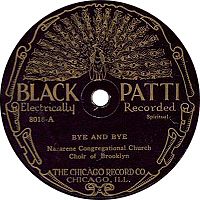J. Mayo Williams
This article needs additional citations for verification. (February 2018) |
 Williams in 1920 | |
| Born: | September 25, 1894 Pine Bluff, Arkansas |
|---|---|
| Died: | January 2, 1980 (aged 85) Chicago, Illinois |
| Career information | |
| Position(s) | End |
| Height | 5 ft 11 in (180 cm) |
| Weight | 174 lb (79 kg) |
| College | Brown |
| Career history | |
| As player | |
| 1921 | Canton Bulldogs |
| 1921–1923 | Hammond Pros |
| 1924 | Dayton Triangles |
| 1924 | Hammond Pros |
| 1925 | Cleveland Bulldogs |
| 1925–1926 | Hammond Pros |
| Career highlights and awards | |
| Military career | |
| Allegiance | United States |
| Service/ | |
| Years of service | 1917–1919 |
| Battles/wars | World War I |
Jay Mayo "Ink" Williams (September 25, 1894 – January 2, 1980) was a pioneering African-American producer of recorded blues music. Some historians have claimed that Ink Williams earned his nickname by his ability to get the signatures of talented African-American musicians on recording contracts,[1] but in fact it was a racial sobriquet from his football days, when he was a rare Black player on white college and professional teams.[2] He was the most successful "race records" producer of his time, breaking all previous records for sales in this genre.
Biography
Williams was born in Pine Bluff, Arkansas, the son of Millie and Daniel Williams.[a] When he was seven years old, his father was murdered, and the family returned to his mother's hometown of Monmouth, Illinois, where he grew up.
Williams attended
After graduating in 1921, he moved to

In 1927, Williams was recruited to operate
In 1934, Williams was hired as head of the "race records" department at
Williams was accused by some black musicians of a "dicty" attitude[7] – that is, acting as though he was a member of the white middle class. His efforts to refine the articulation of rural blues artists and polish their images were often met with hostility and misunderstanding. In addition to producing, he also managed some of the many artists he recorded, even sharing ownership of some songs as a co-writer. Songs on which he is credited as co-writer include "Corrine, Corrina", Nellie Lutcher's "Fine Brown Frame", Louis Jordan's "Mop Mop", "Keep A Knocking" Bert Mays and Stick McGhee's "Drinkin' Wine Spo-Dee-O-Dee" among others.
Williams set up the Chicago Music Publishing Company (CMPC) as publisher for all the titles he recorded. The CMPC collected all royalties generated by the materials it held copyrights on, and was responsible for passing on some of the profits to the composer or performer. However, many successful artists that Williams recorded, including Blind Blake and Blind Lemon Jefferson, probably never received any royalties. Race record entrepreneurs knew that rural blues musicians were unfamiliar with copyright laws, and they further played upon the musicians' vulnerability by providing free liquor at recording sessions, hoping they would get drunk and sign their rights away.[1]

After leaving Decca in 1945, Williams worked freelance and ran several small, independent labels.
As plans were being initiated to conduct interviews with Williams to gather his life story in 1980, he died in a Chicago nursing home. He was buried at Burr Oak Cemetery in Alsip, Illinois.
Legacy
Williams was a member of the National Football Hall of Fame Association. In 2004, he was posthumously inducted into the Blues Hall of Fame.[9]
Notes
- ^ Most sources state that he was born in Monmouth, Illinois. This is incorrect; see talk page.
- ^ See talk page.
References
- ^ ISBN 0-87722-583-4.
- ^ Whitman, Burt (October 19, 1919) "22,000 See Brown Hold Harvard to a 7 to 0 Victory", Boston Herald. p. 17.
- ^ ISBN 978-1-888451-68-9.)
{{cite book}}: CS1 maint: date and year (link) CS1 maint: multiple names: authors list (link - ^ ISBN 0-85112-673-1.
- ISBN 978-0-8265-2175-0.)
{{cite book}}: CS1 maint: date and year (link - ISBN 978-0-253-00747-6.)
{{cite book}}: CS1 maint: date and year (link - ISBN 0-571-12939-0.
- ^ Clemson.edu Archived June 22, 2009, at the Wayback Machine
- ^ "2004 Blues Hall of Fame Inductees". Blues Foundation. Retrieved January 7, 2023.
External links
- Biography
- Carroll, Bob (1995). "Doc Yound and the Hammond Pros" (PDF). Coffin Corner. 17 (1). Professional Football Researchers Association: 1–3. Archived from the original (PDF) on October 7, 2010.
- Charliegillett.com (Special tribute to his life)
